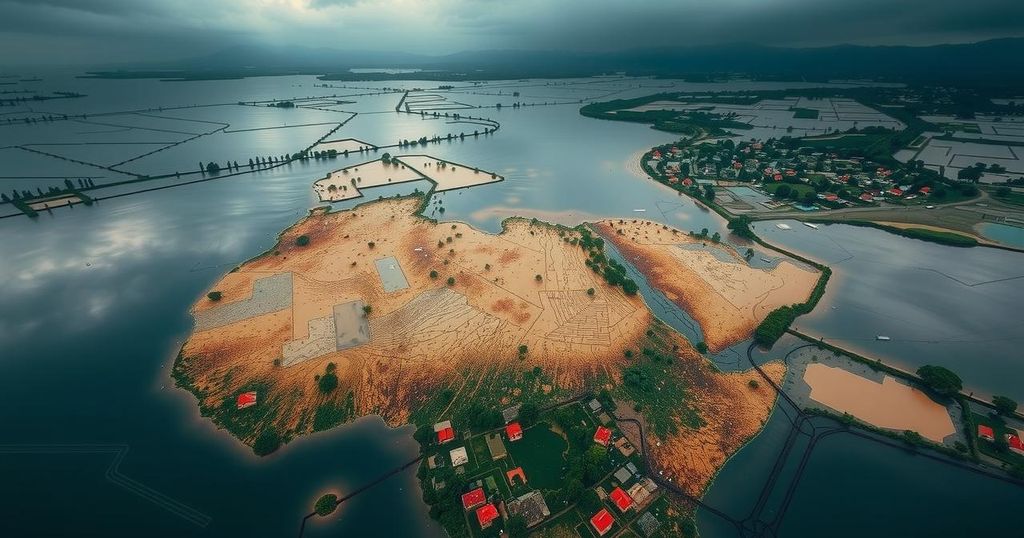Severe floods, exacerbated by climate change, have impacted 6.9 million individuals in West and Central Africa in 2024, particularly affecting areas like Kogi State, Nigeria. Long-term residents face recurring destruction of homes and loss of possessions. Experts warn that extreme weather patterns will continue to worsen without substantial global emissions reductions.
In the past twelve years, 67-year-old Idris Egbunu has repeatedly faced the devastating consequences of floods in his home in central Nigeria, where the Niger River frequently overflows during the rainy season. Each flood inundates his home, requiring extensive cleaning and repairs before the cycle repeats. The region of Lokoja, located in Kogi State, Nigeria, has become notorious for its flooding, exacerbated by the impacts of climate change. Across Africa, climate change is significantly altering weather patterns, resulting in more severe flooding events, particularly this year. The United Nations Office for the Coordination of Humanitarian Affairs (OCHA) reports that approximately 6.9 million individuals in West and Central Africa have been impacted by floods in 2024 alone. Since 2012, Kogi State has experienced increasingly severe floods annually, culminating in 2022’s catastrophic flooding, which claimed over 500 lives and displaced 1.4 million residents. While this year’s flooding has not reached the disastrous levels of 2022, officials, including emergency advisor Sandra Musa, indicate that the situation is still dire, affecting around two million people. The effects of climate change are starkly visible; for instance, Fatima Bilyaminu, a mother and shopkeeper, describes accessing her home in Lokoja only by boat due to rising waters. She has lost all her possessions, including furniture and kitchen supplies, but remains unable to relocate due to financial constraints. Although Africa contributes merely four percent of global greenhouse gas emissions, it disproportionately bears the brunt of climate change impacts, such as severe flooding. Aida Diongue-Niang of the United Nations’ Intergovernmental Panel on Climate Change (IPCC) asserts that the unusual amount of rainfall this year, alongside numerous extreme weather events, underscores the dangers of climate change. The Sahel region, in particular, has recorded unprecedented rainfall levels. Areas in Niger reported up to 200 percent more rainfall than in previous years, prompting concerns for significant sites like the UNESCO World Heritage city of Agadez. Additionally, devastating floods in Chad killed at least 576 people and affected nearly two million individuals, while adverse weather similarly devastated regions in Cameroon and Guinea. Experts emphasize that the historical pattern of flooding has intensified, evolving from a decadal occurrence to an annual crisis. Clair Barnes from Imperial College London warns that, without a transition away from fossil fuel dependence, these conditions will likely worsen. The IPCC’s Diongue-Niang stresses the necessity of global efforts to reduce greenhouse gas emissions as the primary solution to extreme weather challenges. In conclusion, the rampant flooding in Africa, fundamentally progressed by climate change, poses severe risks to human life, food security, and infrastructure. Urgent action on both mitigation of emissions and adaptation strategies is essential to address the impending crises resulting from climate change.
The ongoing dialogue surrounding climate change highlights the pressing issues faced by vulnerable populations, particularly in Africa, where extreme weather events like flooding are on the rise. The frequency and severity of such phenomena not only threaten the lives and livelihoods of millions but also jeopardize essential resources like food security and safe housing. With climate change contributing to unpredictable weather patterns, understanding the implications becomes critical for developing proactive measures to address its impact.
In summary, the increased frequency and intensity of flooding in Africa serve as a dire warning regarding the impacts of climate change on vulnerable communities. With millions affected and vital infrastructure compromised, regional and global stakeholders must take immediate action to confront the root causes of climate change, particularly through reducing greenhouse gas emissions. The survival of countless individuals hangs in the balance, emphasizing the urgency to address these issues collectively on a global scale.
Original Source: www.barrons.com






